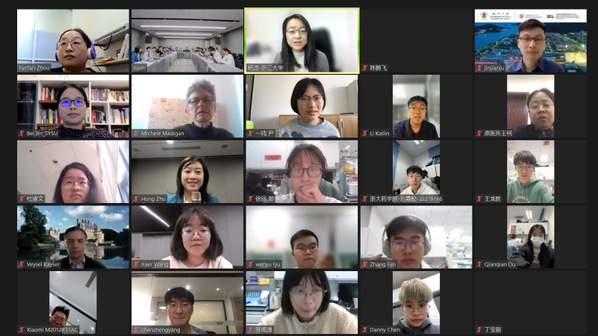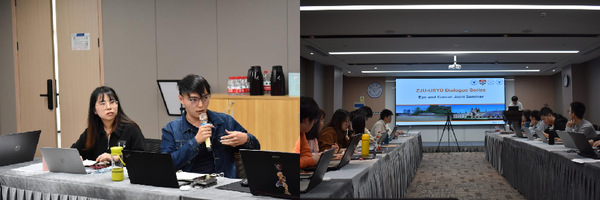Focusing on the recent research progress on drug discovery and development of eye diseases and cancers, the international academic communication of ZJU-USYD Dialogue Series: eye and cancer joint seminar was successfully held online on Nov.2, 2022. The seminar was jointly hosted by Zhejiang University (ZJU) and University of Sydney (USYD), participated by University of Macau, Sun Yat-sen University and Jiangsu Institute of Nuclear Medicine, supported by the Partnership Collaboration Awards (PCA) of ZJU and USYD. To encourage constructive dialogues and explore collaborations to improve clinical outcomes in human eye diseases and cancers, this workshop discussed in depth on several specific topics including general knowledge advancement on eye health, immunotherapy development in eye diseases and cancers and the applications of novel technologies in eye disease and cancer treatment.

Prof. YANG Bo, dean of The Sci-Tech Academy, ZJU, and Prof. Andrew McLachlan, head of Sydney Pharmacy School, USYD, delivered opening remarks, introduced the speakers attending this seminar, and extended their cordial welcome to all participants in this joint seminar. Prof. YANG Bo said that ZJU and USYD have successfully built long-term strategic partnership over the years; as two of the most prestigious universities worldwide, both universities share the same vision and values in providing excellent quality education and research, fostering creativity and diversity, and contributing to the well-being of the broadest communities. And particularly, all are concrete to the commitment to innovative drug discovery and development for human wellness. The College of Pharmaceutical Sciences at Zhejiang University, which is her home college, is devoted to multidisciplinary research within the biomedical and pharmaceutical framework and is establishing a high-efficiency translational study scheme, which can significantly boost the conversion and translation of original research findings towards clinical applications. To fulfill the commitment to drug innovation for global health issues, the researchers in ZJU are eager to establish and maintain a tight connection and collaboration with researchers worldwide who are dedicated to the related fields. Prof. Andrew McLachlan sent his greeting to participants and wished all to be immersed in this communication and encounter collision of the sparks of thought. He looked forward to the continuous in-depth collaboration and emerging achievements between ZJU and USYD.

The opening ceremony was followed by two sessions. Session I focused on therapeutic development in eye diseases. Prof. Michele Madigan (Save Sight Institute, USYD) presented a brief review of human eye anatomy, highlighting potential barriers for therapies and emerging drug developments and strategies for anterior and posterior eye diseases. Due to the special physiological structure of eyes, drug delivery and absorption are the spotlight of current research. She thought that targeted therapy and gene therapy might be directions of future exploration. Prof. ZHOU Fanfan (Sydney Pharmacy School, USYD), Prof. WANG Ke (Jiangsu Institute of Nuclear Medicine) and Prof. JIN Bei (Sun Yat-sen University) reviewed drug discovery and development in human uveal melanoma (UM) and shed new lights on the possibility of inhibiting UM metastasis. The compound NM2 developed by Prof. ZHOU Fanfan and Prof. WANG Ke's team may be a novel effective drug in the treatment of metastatic UM. Prof. JIN Bei validated EZH2 as a druggable target in metastatic UM patients. Their studies shed light on understanding and interfering complicated metastatic process of UM and bring hope for the treatment and suppression of UM metastasis. In addition, Prof. ZHU Ling (Save Sight Institute, USYD) shared his team's effort on the drug development to target macular degeneration. RNA drugs delivered by lipid nanoparticles may serve as the advanced delivery system for therapeutic payload, developing personalized therapies for dry Human Age-related Macular Degeneration (AMD).
The topic of Session II was “Research advancement in anti-cancer immunotherapy and target identification”. Prof. LU Jinjian (University of Macau) took immune checkpoint PD1/PD-L1 and THP or CD47 combination therapy as examples, to highlight the research advance in preclinical combination strategies and mechanisms in cancer treatment. Prof. ZHU Hong (College of Pharmaceutical Sciences, ZJU) shared the recent research on Hepatocellular carcinoma (HCC). HCC remains a global health threat. Although metabolic alteration has been revealed to be closely related to HCC progression, the underlying mechanism remains unclear. Prof. ZHU Hong depicted the function of YAP/TAZ serving as a potential target in HCC patients with SDHA/B dysregulation, based on their research that SDHA/B regulated YAP/TAZ stabilization in a NEDDylation dependent manner.
Inspired by the opinions speakers shared, audience enthusiastically raised questions and both sides engaged in further academic communication about researches reported above. At the end, moderated by Prof. ZHOU Fanfan and Prof. ZHU Hong,the seminar was concluded by an in-depth discussion on the prospects for collaboration in research and education in human eye disease and cancers.
Drug development for eye diseases and cancer remains a thorny but pressing issue. The speakers delivered their notable research achievement in therapeutic development in human eye disease and cancer, providing new perspectives in these fields. These talks were not merely a rewarding to audience, especially those who would like to take advantage of international research opportunities and particularly relevant to early career researchers who are keen to develop their global network, but also a powerful attempt to the One Health initiative launched by World Health Organization (WHO), a positive step to optimize the health of people.

Source: The research team led by Prof. YANG Bo and Prof. HE Qiaojun
(From ZJU NEWSROOM)

